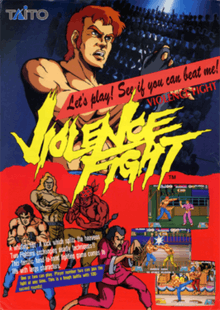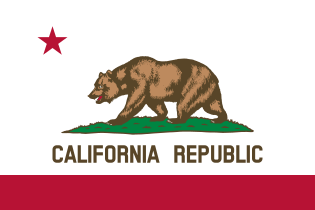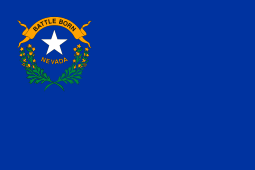Violence Fight
Violence Fight (バイオレンスファイト), is a 1989 fighting arcade game developed and published by Taito.
| Violence Fight | |
|---|---|
 European arcade flyer | |
| Developer(s) | Taito |
| Publisher(s) | Taito |
| Designer(s) | Yukihiko Sakamoto |
| Programmer(s) | Takeshi Ishizashi, Yumi Inoue |
| Composer(s) | Team Zuntata |
| Platform(s) | Arcade |
| Release | April 25, 1989[1] |
| Genre(s) | 2D Versus Fighting |
| Mode(s) | Up to 2 players simultaneously |
| Arcade system | Taito B System |
| CPU | 68000 @ 12 MHz, Z80 @ 6 MHz |
| Sound | YM2203 @ 3 MHz, 2× MSM6295[2] @ 1.056 MHz[3] |
| Display | Horizontal, 320×224 pixels, 60 Hz, 4096 colors |
Violence Fight was later included in Taito Memories Vol. 2 for the PlayStation 2, and Taito Legends 2 for the PlayStation 2, Xbox and Windows. Violence Fight was also followed by a sequel released two years later titled as Solitary Fighter (known in Japan as Violence Fight II (バイオレンスファイトII)).
Plot
As the attract screen explains, the game takes place during the early 1950s in the United States, where an underground tournament known as the "Violence Fight" had become very popular among the criminal underworld and the public at large; criminals, especially mobsters, along with other public nuisances and upstanding citizens are allured by its stakes and thrill. The contestants, drawn from all across the country, compete for large sums of money and the title of "No. 1 Quarreler." As the game begins, the tournament even attracts a young fighter named Bad Blue (or "Bat Blue") from Los Angeles who competes for the title of No. 1 Quarreler and aspires to share a small fortune with his manager, "Blinks."
Gameplay
Violence Fight plays similarly to other beat 'em ups like Double Dragon, where the player can move in all eight directions in an arena fight. Also, there are three buttons: punch, kick and jump. However, unlike most side-scrolling fighters, the players fight in an enclosed arena space. Players can press either punch + jump or kick + jump to perform either a special punch or a special kick move. Players also can press punch + kick to duck for a short period of time. While the opponent is struggling to get up, the punch button can be used to throw him to the ground for some damage. The punch button is also used to pick up crates, barrels and other similar objects.
Each match consists of up to three rounds. The timer will initially be set at 100 seconds, or 1 minute, 40 seconds. Your objective is to get your opponent's life meter to zero to win a round. Winning two out of three rounds will win the match. Each brawler begins the round with 100 health points. Direct hits to your opponent will reduce his health gradually, based on certain factors. For each round won, you gain one point towards winning the match. If time runs out in a round, the round will end in a draw. If two of three rounds end in a draw, the brawler with only one point will be the winner. If the point totals are tied at the end of all three rounds, the match ends in a draw. If you get more points than your opponent, you'll continue on to the next gameplay round, or "stage" of the game. If your opponent has more points than you, your game is over and you'll have the option of continuing the game, at the cost of one additional coin. If the match ends in a draw against the CPU, it will be the same as a loss. If the match ends in a draw of a 2-player match, either player will have to insert another coin to continue the single-player campaign.
Characters
There are four playable fighters, and two unplayable bosses.




Bosses


Reception
In Japan, Game Machine listed Violence Fight on their January 15, 1990 issue as being the thirteenth most-successful table arcade unit of the year.[4]
References
- http://www.arcade-history.com/?n=violence-fight&page=detail&id=3076
- http://system16.com/hardware.php?id=660
- http://mamedev.org/source/src/mame/drivers/taito_b.c.html
- "Game Machine's Best Hit Games 25 - テーブル型TVゲーム機 (Table Videos)". Game Machine (in Japanese). No. 372. Amusement Press, Inc. 15 January 1990. p. 25.
External links
- Violence Fight at the Killer List of Videogames
- Violence Fight at arcade-history